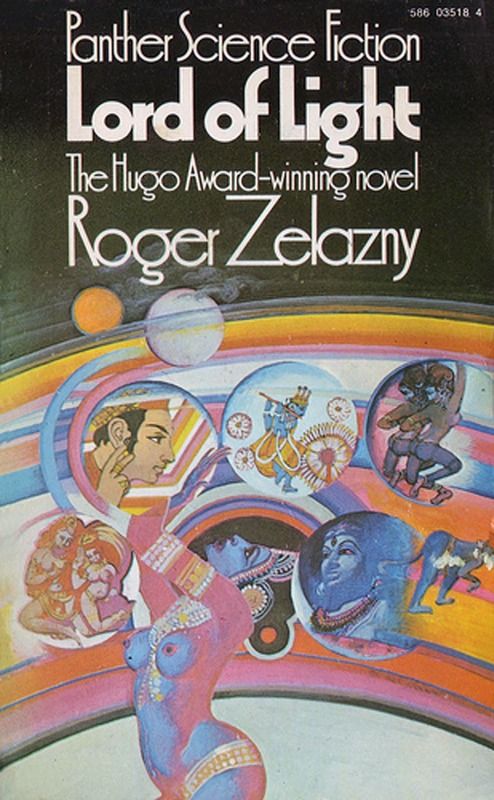Guest Post by Misha Burnett: Lord of Light by Roger Zelazny
Monday , 22, August 2016 Appendix X 6 CommentsIf You Meet The Buddha On The Road, Kill Him: Roger Zelazny’s Lord Of Light
 Roger Zelanzy’s Lord Of Light was published in 1967 and won the Hugo in 1968. It was originally published by Doubleday and has been reprinted by Harper-Voyager. There seems to be neither e-book nor audio editions available. (Pity.)
Roger Zelanzy’s Lord Of Light was published in 1967 and won the Hugo in 1968. It was originally published by Doubleday and has been reprinted by Harper-Voyager. There seems to be neither e-book nor audio editions available. (Pity.)
His followers called him Mahasamahtman and said that he was a god. He preferred to drop the Maha- and -ahtman, however, and called himself Sam. He never claimed to be a god. But then, he never claimed not to be a god. Circumstances being what they were, neither admission could be of any benefit. Silence, though, could.
Therefore, there was mystery about him.
Seldom does an opening paragraph of a novel so perfectly capture both the tone and theme of the work. Zelazny has gone on record saying that he wrote this book to be read as either science fiction or fantasy. It works as both, blurring the lines between genres and making it look effortless.
This is the story of Sam, who could have been a god and chose not to be. It takes place on a colony world of long-vanished Earth. Society has become stratified, with the great majority of humans living in a simple agrarian society and a small elite group wielding advanced technology that makes them, for all practical purposes, gods.
Sam, who was one of the original ship’s crew, is an iconoclast and a revolutionary. Setting himself against the power of the ruling elite, he takes upon himself the identity of the Buddha, preaching civil disobedience and atheism.
The deep political theme is everywhere evident, but what saves this novel from polemic is the intimacy of Zelazny’s voice. Neither the arguments of the Theocrats or the Accelerationists are presented in absolute abstract terms, instead we are shown the consequences of the competing philosophies in the lives of very human characters.
The scale of the novel is simultaneously epic and immediate. As is common in Zelanzy’s works, many of the characters are effectively immortal, and the petty feuds and jealousies ring down through the centuries. Cities rise and fall, but the fundamental things—love, hate, fear, hope—apply as time goes by.
There is action aplenty here, battles between gods and men, demons and monsters. The descriptions are vivid and the fantastic elements seem very real—almost ordinary. You believe in Sam, and Sam’s world, and you can’t help but care about him and want him to succeed in his mad, quixotic quest to free humanity from the yoke of heaven. And yet the gods—those who call themselves gods—are also fully realized characters, not cardboard cutouts but people trying to do the best they can within the system they created.
It’s the kind of book that hooks you from the first lines and doesn’t let you go until you read the last word, and will make you think long after that.
—
Misha Burnett is the author of Catskinner’s Book, Cannibal Hearts, The Worms Of Heaven, and Gingerbread Wolves, modern fantasy novels collectively known as The Book Of Lost Doors.
While I’ve come to find that I’m not that big a fan of Zelazny, I’ll still say this book is a must-read.
If only the film version of this, with Jack Kirby concept art, had made it out of development hell….
Lord, I loved this book both times I read it. Time for a reread, I guess
While I prefer his fantasy, I think that Lord of Light and This Immortal are great reads, and examples of Zelazny at his best.
First, an audiobook is – or was – available from Audible Frontiers.
I do not love Sam. Nor emulate him. But I learned much of love, honor, sense, and humility from this book. I want to know Sam. The humor and references in this book are legend. As when the fit hit the Shan of Irabuck.
Worse, every time I finish this book there seems to be something in my eye.
The descriptions are lush. The rigorous scientific outlook of Yama is a revelation. Tak was close kin to my mind when I first read it. Brahma is shown in such a way that I may have known her. We all have. And consider the sea captain. Do you not wonder what happened to the good doctor? I may hope to grow into Jan Olveg in my old age. I someday would like to visit the room called despair – where there is a couch.
And Kubera. I could wish to aspire to such nobility, skill and penetration. I already have his weakness.
When we first meet Niriti the Black the revelation comes so sudden that I really want to know if he is half Irish and half Italian.
I really don’t know if this book is a cannonade or a cavalcade, but it is so much more than one damned thing after another that many novels are these days. A classic, maybe. A treasure, certainly!
DAB